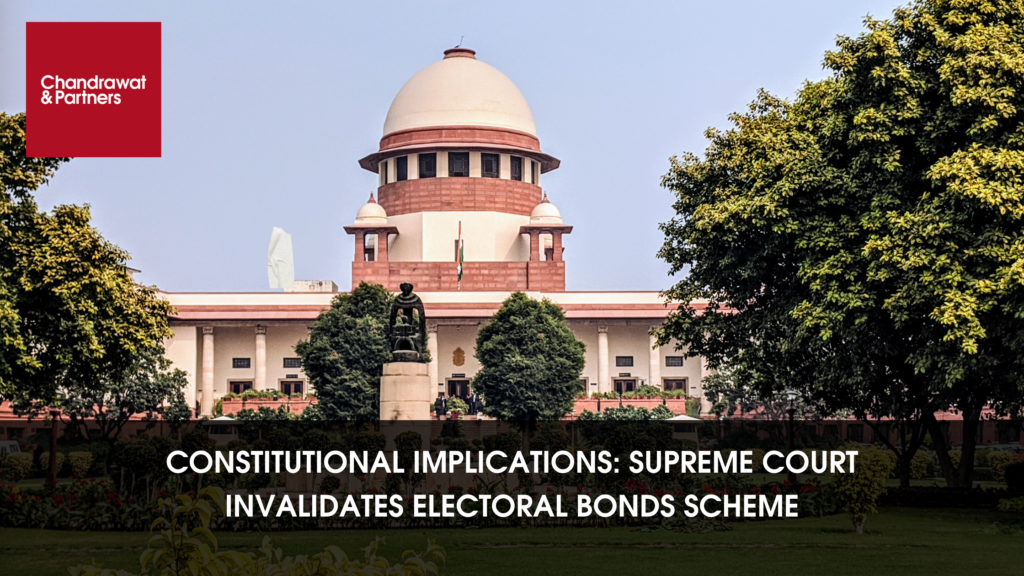Share :
Introduction
In any country with a democratic governance framework, the act of the state conducting elections and the people of the country engaging in them is of an inherent democratic nature. It is only through elections that people find the representation of ideologies/values similar to their own and satisfy the ‘of the people, by the people, for the people’ view as taken in democratic governance. Therefore, elections are equated to an act that is facilitating or instrumentalising democracy.
Considering the importance of elections, the government of India on 2nd January 2018, notified the Electoral Bond Scheme in exercise of the power entailed u/s 31(3) of the Reserve Bank of India Act, 1934. The definition of ‘electoral bonds’ as per clause 2(a) of the Electoral Bond Scheme gives the Electoral Bond a status as that of a promissory note which is a bearer banking instrument and does not carry the name of the buyer.
Electoral bonds function similarly to promissory notes, available for purchase by both companies and individuals in India through the State Bank of India (“SBI”). These bonds can then be donated to political parties, which have the option to redeem for cash.
The case of Association for Democratic Reforms (“ADR”) and Anr. v. Union of India is a notable instance that has greatly enhanced transparency in Indian politics. This court case was a turning point in Indian legal history, creating precedents that still influence the political climate in the nation.
BACKGROUND
Article 324(2) of the Indian Constitution provides for the procedure to appoint members of the Election Commission. The petitioner in this case is the Association for Democratic Reforms (ADR) who has worked towards electoral and political reforms including through litigation before the Supreme Court.
In the petition, ADR argues that the present practice of appointment of Election Commissioners by the Centre is violative of Articles 14, 324(2) and the basic features of the Constitution. This is on the ground that the Executive had appointed the members of the Election Commission. They had not consulted with the necessary authorities to ensure the appointments avoided political and executive interference.
In the present case, the Petitioners have challenged the Electoral Bond Scheme as well as a list of laws including, the Representation of Peoples Act, 1934, the Income Tax Act, 1961, the Companies Act, 2013 and the Finance Act, 2017, as unconstitutional and thereby sought to attract the Supreme Courts writ jurisdiction to be exercised over the matter.
KEY ISSUES
- Is the electoral bond scheme constitutional?
- Does the electoral bond scheme violate the voters’ right to information?
- Can the Scheme allow anonymity with the view to protect donors’ right to privacy?
- Does the electoral bond scheme threaten the democratic process, and free and fair elections?
CHALLENGES TO THE AMENDMENTS
-
Shortly after the amendments were introduced, in September 2017 and January 2018, two Non-Governmental Organisations—Association for Democratic Reforms (ADR) and Common Cause— and the Communist Party of India (Marxist) filed petitions in the Supreme Court challenging the amendments. At the outset, the petitions argued that the Finance Acts were wrongfully passed as money bills to prevent higher scrutiny by the Rajya Sabha. This challenge is tagged with the larger challenge to the use of money bills under Article 110.
SUPREME COURT’S DECISION INVALIDATING THE ELECTORAL BONDS SCHEME
While approaching the multi-faceted case at hand, the Supreme Court dwelled on several important aspects of law to carve out a baseline for determining the constitutionality of the said Scheme in question.
The matter is one relating to Article 21 and the well-recognised Right to Information, required for the court to adapt its approach based on the question being asked. Thus, to arrive at a rational conclusion, the Supreme Court adopted a narrow view wherever necessary, and a broad view wherever necessary, signifying the importance of not confining to a specific bent of judgment while hearing and deciding matters of varying nature.
The Court unanimously invalidated the Union’s 2018 Electoral Bonds (EB) Scheme on February 15, 2024. The Bench determined that the Scheme infringed upon voters’ constitutionally guaranteed access to information as stated in Article 19(1)(a). The Court further ordered an immediate halt to the sale of electoral bonds. SBI was instructed to provide the ECI with information about all of the electoral bonds it has bought after April 12, 2019. This will contain information about the buyer as well as the political parties to whom the bonds were distributed. In addition, the Court mandated that the ECI post the data that SBI had supplied on its official website within a week of receiving it (i.e., by March 13, 2024).
CONCLUSION
The electoral process stands as the cornerstone of democracy, ensuring that citizens can freely exercise their right to choose their representatives. Integral to this process is ensuring the upholding of our right to information which enables voters to make informed decisions by accessing transparent and comprehensive data about candidates, policies, funding and governance.
For more information or queries, please email us at
enquiries@chandrawatpartners.com




